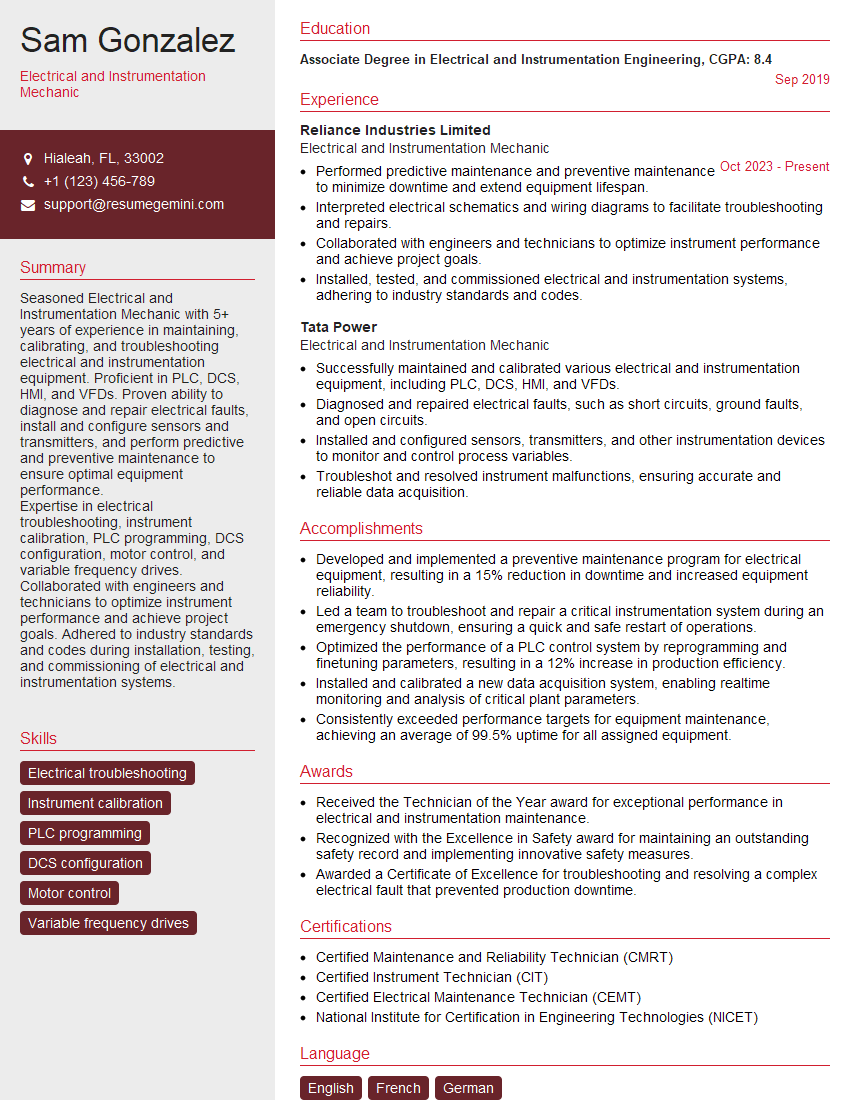Are you a seasoned Electrical and Instrumentation Mechanic seeking a new career path? Discover our professionally built Electrical and Instrumentation Mechanic Resume Template. This time-saving tool provides a solid foundation for your job search. Simply click “Edit Resume” to customize it with your unique experiences and achievements. Customize fonts and colors to match your personal style and increase your chances of landing your dream job. Explore more Resume Templates for additional options.

Sam Gonzalez
Electrical and Instrumentation Mechanic
Summary
Seasoned Electrical and Instrumentation Mechanic with 5+ years of experience in maintaining, calibrating, and troubleshooting electrical and instrumentation equipment. Proficient in PLC, DCS, HMI, and VFDs. Proven ability to diagnose and repair electrical faults, install and configure sensors and transmitters, and perform predictive and preventive maintenance to ensure optimal equipment performance.
Expertise in electrical troubleshooting, instrument calibration, PLC programming, DCS configuration, motor control, and variable frequency drives. Collaborated with engineers and technicians to optimize instrument performance and achieve project goals. Adhered to industry standards and codes during installation, testing, and commissioning of electrical and instrumentation systems.
Education
Associate Degree in Electrical and Instrumentation Engineering
September 2019
Skills
- Electrical troubleshooting
- Instrument calibration
- PLC programming
- DCS configuration
- Motor control
- Variable frequency drives
Work Experience
Electrical and Instrumentation Mechanic
- Performed predictive maintenance and preventive maintenance to minimize downtime and extend equipment lifespan.
- Interpreted electrical schematics and wiring diagrams to facilitate troubleshooting and repairs.
- Collaborated with engineers and technicians to optimize instrument performance and achieve project goals.
- Installed, tested, and commissioned electrical and instrumentation systems, adhering to industry standards and codes.
Electrical and Instrumentation Mechanic
- Successfully maintained and calibrated various electrical and instrumentation equipment, including PLC, DCS, HMI, and VFDs.
- Diagnosed and repaired electrical faults, such as short circuits, ground faults, and open circuits.
- Installed and configured sensors, transmitters, and other instrumentation devices to monitor and control process variables.
- Troubleshot and resolved instrument malfunctions, ensuring accurate and reliable data acquisition.
Accomplishments
- Developed and implemented a preventive maintenance program for electrical equipment, resulting in a 15% reduction in downtime and increased equipment reliability.
- Led a team to troubleshoot and repair a critical instrumentation system during an emergency shutdown, ensuring a quick and safe restart of operations.
- Optimized the performance of a PLC control system by reprogramming and finetuning parameters, resulting in a 12% increase in production efficiency.
- Installed and calibrated a new data acquisition system, enabling realtime monitoring and analysis of critical plant parameters.
- Consistently exceeded performance targets for equipment maintenance, achieving an average of 99.5% uptime for all assigned equipment.
Awards
- Received the Technician of the Year award for exceptional performance in electrical and instrumentation maintenance.
- Recognized with the Excellence in Safety award for maintaining an outstanding safety record and implementing innovative safety measures.
- Awarded a Certificate of Excellence for troubleshooting and resolving a complex electrical fault that prevented production downtime.
Certificates
- Certified Maintenance and Reliability Technician (CMRT)
- Certified Instrument Technician (CIT)
- Certified Electrical Maintenance Technician (CEMT)
- National Institute for Certification in Engineering Technologies (NICET)
Career Expert Tips:
- Select the ideal resume template to showcase your professional experience effectively.
- Master the art of resume writing to highlight your unique qualifications and achievements.
- Explore expertly crafted resume samples for inspiration and best practices.
- Build your best resume for free this new year with ResumeGemini. Enjoy exclusive discounts on ATS optimized resume templates.
How To Write Resume For Electrical and Instrumentation Mechanic
- Highlight your technical skills and experience in PLC programming, DCS configuration, and motor control.
- Showcase your ability to troubleshoot and repair electrical and instrumentation equipment efficiently.
- Quantify your accomplishments whenever possible, using specific metrics to demonstrate your impact.
- Proofread your resume carefully before submitting it to ensure there are no errors in grammar or spelling.
- Consider obtaining industry certifications, such as the Certified Maintenance and Reliability Technician (CMRT) certification, to enhance your credibility.
Essential Experience Highlights for a Strong Electrical and Instrumentation Mechanic Resume
- Maintained and calibrated various electrical and instrumentation equipment, including PLC, DCS, HMI, and VFDs.
- Diagnosed and repaired electrical faults, such as short circuits, ground faults, and open circuits.
- Installed and configured sensors, transmitters, and other instrumentation devices to monitor and control process variables.
- Troubleshot and resolved instrument malfunctions, ensuring accurate and reliable data acquisition.
- Performed predictive maintenance and preventive maintenance to minimize downtime and extend equipment lifespan.
- Interpreted electrical schematics and wiring diagrams to facilitate troubleshooting and repairs.
- Collaborated with engineers and technicians to optimize instrument performance and achieve project goals.
Frequently Asked Questions (FAQ’s) For Electrical and Instrumentation Mechanic
What are the key skills required for an Electrical and Instrumentation Mechanic?
Electrical troubleshooting, instrument calibration, PLC programming, DCS configuration, motor control, and variable frequency drives are essential skills for an Electrical and Instrumentation Mechanic.
What industries employ Electrical and Instrumentation Mechanics?
Electrical and Instrumentation Mechanics are employed in various industries, including manufacturing, power generation, oil and gas, and food and beverage.
What is the career outlook for Electrical and Instrumentation Mechanics?
The career outlook for Electrical and Instrumentation Mechanics is expected to be good, with a projected growth rate of 6% from 2020 to 2030.
What is the average salary for an Electrical and Instrumentation Mechanic?
The average salary for an Electrical and Instrumentation Mechanic varies depending on experience, location, and industry, but it typically ranges from $60,000 to $90,000 per year.
What are the benefits of working as an Electrical and Instrumentation Mechanic?
Benefits of working as an Electrical and Instrumentation Mechanic include job security, opportunities for advancement, and competitive salaries.
How can I become an Electrical and Instrumentation Mechanic?
To become an Electrical and Instrumentation Mechanic, you typically need a high school diploma or equivalent and complete an apprenticeship or vocational training program.